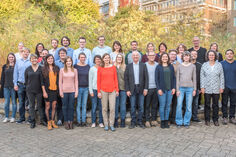Projekte der AG Klinische Studien
MAGELLAN
Magnetic resonance guided adaptive stereotactic body radiotherapy for lung tumors in ultracentral location: the MAGELLAN trial (ARO 2021-3)
Trial registration number: NCT04925583 (ClinicalTrials.gov)
Project description
Radiotherapy is a standard treatment for patients suffering from ultracentral lung tumors. However, because it is a very aggressive treatment, treating healthy tissue with radiotherapy can lead to severe complications. In the MAGELLAN trial, MRI guided radiotherapy is used in order to achieve a better accuracy for delivering the radiotherapy doses to the correct areas. MAGELLAN is a phase I dose escalation trial with the primary goal of finding the maximum tolerable dose of radiotherapy that can be administered with this strategy.
It is common for dose escalation studies to be conducted in a so called 3+3 design. This procedure, however, is widely criticized for being too susceptible to making wrong decisions because of variance and for not using all available data. Therefore, MAGELLAN is conducted using the continual reassessment method instead of a 3+3 design to determine the dose recommendations. This method aims the solve the aforementioned problems by modeling toxicity events in a Bayesian framework using all available data.
Financing: NCT Proof-of-Concept Call
Publication(s)
Study protocol: https://ro-journal.biomedcentral.com/articles/10.1186/s13014-022-02070-x
SETPOINT 2
Stroke Related Early Tracheostomy versus Prolonged Orotracheal Intubation in Neurocritical Care Trial 2
Trial registration number: NCT02377167 (ClinicalTrials.gov)
Project description
Patients with severe stroke often require mechanical ventilation to stay alive. In the short term, this ventilation is usually done by placing a breathing tube through the mouth of the patient. For long-term ventilation, it is usually more convenient to ventilate patients via a tube that is placed directly through an incision in their trachea.
It was hypothesized that a combination of the SETSCORE and other inclusion criteria could be used to identify a patient population that is very likely to require long-term ventilation. It was further hypothesized that for this population, it would be beneficial to direct these patients to a ventilation via tracheostomy sooner than what would normally be the standard timing (sooner than 5 days vs. later than 10 days).
The SETPOINT2 randomized clinical trial was conducted to investigate this hypothesis. SETPOINT2 was a multinational trial including 26 centers from the US and Germany which recruited 382 patients. The trial was conducted over 5 years and had a planned interim analysis after 127 patients. In the final analysis, the primary effect estimate was obtained by fitting a logistic regression model. The trial further featured various prespecified subgroup and sensitivity analyses, as well as detailed descriptions of quality of life and safety endpoints. In the end, no benefit of the early tracheostomy strategy could be shown. The results were published in a high-ranking journal (Bösel et al., 2022).
Publication(s)
Study results: https://jamanetwork.com/journals/jama/fullarticle/2792016
EFFECTBACK
EFFects of Exposure and Cognitive-behavioral Therapy for chronic BACK pain (‘EFFECT-BACK‘)
Trial registration number: NCT05294081
Project description
Chronic low back pain is a major cause for medical expenses, work absenteeism and disability. According to recent guidelines, however, commonly offered treatments such as injections or surgeries are not efficacious. Pharmacotherapy shows small treatment effects, but the risk for side effects is high. Cognitive behavioral therapy combined with exercise does improve pain and disability, but treatment effects are also small to moderate and the treatment is costly, since it is usually provided in an inpatient setting.
An alternative but rarely used psychological treatment option is exposure therapy. Randomised pilot studies showed that exposure therapy is more effective than cognitive behavioral therapy in reducing movement-related impairment. EFFECT-BACK is the first multicentre randomised controlled trial which compares cognitive behavioral therapy and exposure therapy in a large sample of 380 patients with chronic back pain with a planned study duration of 3 years.
The primary endpoint of the trial is clinically significant improvement in pain-related impairment from baseline to 6 months after end of intervention, which is measured using the QBPDS questionnaire and will be analysed using a generalised mixed-effects model. Secondary endpoints include other patient-related outcomes such as the HADS, PCS and PHODA scores. An exploratory objective of the trial is to identify patient subgroups who benefit most from the exposure therapy.
Financing: DFG Programm “Klinische Studien“
APOS
Antibiotic Prophylaxis for preventing infectious complications in Orthognathic Surgery - Phase III, multicentre, randomised, controlled, double- blinded trial with two parallel study arms
Trial registration number: 2020-001397-30 (EudraCT No.)
Project description
Orthognathic surgeries (OS) are used for correction of deformed jaws and are elective, standardized and reproducible techniques. Since the digestive tract is punctured, surgical site infections (SSI) might occur. To prevent this an antibiotic prophylaxis (AP) might be mandatory. The actual need of AP, however, is not proven and is not mentioned as mandatory in respective guidelines. Furthermore, with increasing antibiotic resistance, the reduction of potential unnecessary antibiotic administration is highly relevant. Thus, APOS is a phase III multicenter, randomized, controlled, double blinded trial with the primary goal of investigating the need of AP after OS by comparing SSI rates of patients with AP and without AP after OS.
The trials intent is to show that the no AP group is not worse than the AP group by more than a specified margin. Hence, a classic superiority trial is not appropriate. Therefore, a non-inferiority trial was designed assuming no differences in SSI rates with a pre-defined non-inferiority margin of 4%. Hence, allowing the no AP group to have an SSI rate of up to 4% worse than the AP group. The study protocol is published open access at BMC trials.
Financing: DFG Programm “Klinische Studien“
Publication(s)
Study protocol: APOS—antibiotic prophylaxis for preventing infectious complications in orthognathic surgery: study protocol for a phase III, multicentre, randomised, controlled, double blinded, clinical trial with two parallel study arms | Trials | Full Text (biomedcentral.com)
FLORA
Fecal Microbiota Transfer in Liver Cancer to Overcome Resistance to Atezolizumab/Bevacizumab – A randomized, placebo-controlled, double-blind Phase II trial
Trial registration number: NCT05690048 (ClinicalTrials.gov)
Project description
In liver cancer, so-called immune checkpoint inhibitors (ICI) are used to intensify the immune response to cancer cells. However, patients may develop a resistance to ICI therapy, hindering its success. It is an object of current scientific attention that the success of ICI is mediated by the quality of the gut microbiota. In the randomized, controlled, double-blind phase II FLORA trial, fecal microbiota transfer is used with the goal of improving the effect of the immune checkpoint inhibitors atezolizumab and bevacizumab in patients with resistance to this kind of therapy.
The primary analysis will focus on an immunological endpoint (tumoral CD8+ cell infiltration after 2 cycles of atezolizumab /bevacizumab) and on safety (incidence and severity of AEs and SAEs). The trial is set up to recruit 48 patients with the goal of observing the immunological endpoint in at least 42 patients. While intercurrent events such as the emergency intake of antibiotics may affect the interpretation of the endpoints, the handling of such events is made transparent by applying the estimands framework already in the planning phase.
Financing: NCT Proof-of-Concept Call


